Table of Contents
About the Organization
The Problem
Dominant approaches to digital technologies are steeped in ideologies of market fundamentalism and have displaced the cornerstone ethics of participation, social justice, and gender equality.
How We're Different
At IT for Change, we believe that progressive development sector actors must come together to influence the techno-social structures that are redefining our societies. We seek to build bridges across different sectors to strive towards a digital society that is equitable.
What We Do
Our work, straddling Data and Artificial Intelligence (AI), Big Tech and Digital Economy, the Digital Public Sphere, Feminist Digitality, Education and Technology, and more, pushes the boundaries of theory and practice to explore new horizons for development justice.
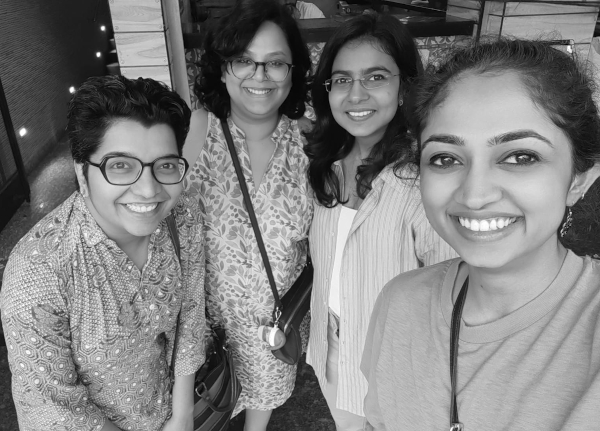
Democratizing the control and use of digital technologies so that individuals and communities are able to use them freely towards their empowerment.
A society in which digital technologies contribute to social justice and equality.
Equity, Social Justice, Gender Equality, and Democracy
- Partnering with local communities
- Forging local and global networks
- Undertaking research
- Engaging with policy spaces
- Creating new institutional capacity
A Note from the Directors
"It was the best of times, it was the worst of times, it was the age of wisdom, it was the age of foolishness, it was the epoch of belief, it was the epoch of incredulity, it was the season of light, it was the season of darkness, it was the spring of hope, it was the winter of despair."
― Charles Dickens, A Tale of Two Cities
The past year was an intense and contradictory period.
At the start, it seemed as if the chink in Big Tech’s armor had been finally exposed – with many leading digital corporations suffering a critical reversal of fortunes. However, later developments, especially the generative AI leap, belied these hopes. The long-term trajectory of the digital revolution seems more likely to entrench the tech leviathans, condemning the majority of the world to an uncertain and precarious future. The wherewithal to generate data-based intelligence is heavily concentrated in private hands, with four transnational digital corporations controlling 67% of the world’s cloud computing facilities. A continued lack of democratic arrangements to govern the essential infrastructure of the 21st century means we are nowhere close to unlocking the social value of data and the digital commons. The tragicomedy of Twitter’s painful transition to ‘X’ is, in fact, a grim reminder of the deep-rooted flaws in the digital economy. As we traverse into the metaverse, a new world of simulation and sensory experience awaits us; but extended reality is nowhere close to utopia.
Amidst this gloom, hope flickers – in the efforts of people’s movements, civil society groups from the Global South, and transnational alliances that have taken up the good fight against Big Tech. Public pressure has led to legislative change in many countries to rein in the excesses of digital corporate power. The need for guardrails to prevent harm from emerging data and AI innovation systems is reasonably well understood in public discourse today. Solutionism and multistakeholderism in digital policy spaces have come under the scanner, pointing to the inevitable corporate capture wrapped in glib ‘tech for SDGs’ language. The UN Secretary-General’s office has initiated a process of consultations to evolve an intergovernmental agreement on an open, free, and secure digital future for all – the Global Digital Compact. A groundswell is emerging with respect to the imperative to address the global governance deficits in the digital paradigm.
In this flux, our discourse and practice have seen impact in four critical areas. We have challenged the dominant digital architectural paradigm, re-making tech through a disavowal of extractive and colonial innovation; we have expanded the lexicon of tech for development, re-centering community participation in and ownership of digital and data infrastructures; we have brought individual and structural aspects of equity and justice together, re-imagining rights for our emerging digital condition; and by centering a Southern epistemic on digitality that draws from the wisdom of people’s movements in policy spaces, we are re-claiming the narrative.
Working in a field where rapid change is the only constant means embracing agility even as we stay true to abiding values and faith in community. From serving as a voice of the South in global, regional, and national policy spaces to actively building up the next generation of digital justice champions and leveraging successes and setbacks in the wider institutional space with alacrity, we believe we have moved the needle.
We invite you to delve into our annual report, which captures the high points of this journey. Our stories are not ours alone. We share our myriad victories and struggles with our allies, partners, and comrades.
Our Impact
1
Re-making Tech
Digital innovation ecosystems have been captured by transnational digital corporations, as a result of which a narrow, profit imperative has overtaken public interest. In our work, we have attempted to challenge the dominant digital paradigm, identifying the building blocks of a sustainable, people-first strategy for digitalization that is led from the South. Our multi-pronged strategies include research on digital public infrastructure and data rights, policy engagement to center feminist perspectives in platform regulation, and public-community models for AI in education.

We developed a people-centric vision of digitalization in India.
With critical civil society constituencies in India, we have been able to take forward the idea of ‘right digitalization’ – moving from a negative agenda towards a positive vision.
For instance, we worked with digital rights groups and grassroots organizations like the Mazdoor Kisan Shakti Sangathan (MKSS) to evolve a vision of people-first digital policy approaches in critical domains such as education, health, agriculture, and social security with the intent of influencing policy trajectories at the national level. We were successful in inputting this thinking into the Government of India’s IDEA initiative for agriculture and the AgriStack data exchange. We have been invited by the office of the Chief Knowledge Officer, Ministry of Agriculture and Farmers’ Welfare, on multiple occasions to provide expert inputs into the design of a farmer-centric AgriStack to deploy open government data in the agriculture sector for equitable outcomes that privilege marginal and small farmers, rather than a corporate-controlled farming paradigm.
In another instance, when invited by NITI Aayog, the Government of India’s nodal planning and visioning body, to provide expert comments on their report, ‘India’s Booming Gig and Platform Economy - Perspectives and Recommendations on the Future of Work’, we took the opportunity to co-convene a roundtable. The event helped crystallize and channel diverse perspectives on platformization and the future of work(ers) from Indian academia and civil society, reflecting evidence from research and practice by several organizations.
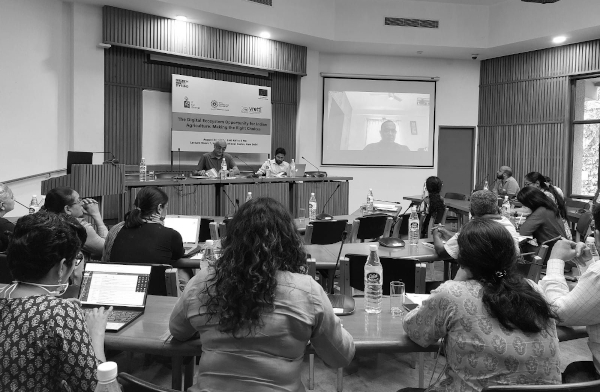
We are happy to report that we have been able to share the deliberations and recommendations from this consultation with NITI Aayog to feed into a ‘Platform India’ roadmap of the government.
We also provided advisory inputs to the EdTech Plan developed by the Telangana SCERT, an apex academic body of the state of Telangana that is responsible for the state’s curricular policy.

In May 2022, at the Multi-Stakeholder Forum on Science, Technology and Innovation for the SDGs, Anita Gurumurthy supported the curation of the thematic session, ‘Global Digital Public Goods, Digitalization, Artificial Intelligence, and Connecting the World by 2030’, in her capacity as a member of the 10-Member Group of High-level Representatives on STI for the SDGs appointed by the UN Secretary-General.
We also developed a policy brief charting a roadmap for public digital infrastructure development in the Global South, which was published as a chapter in the UN Inter-Agency Task Team on STI for the SDG’s report for the Forum.
During Indonesia’s G20 presidency, Parminder Jeet Singh represented us at the Policy Dialogue Forum – a space for civil society (C20) and government working groups to meet and deliberate upon policy outcomes. His contribution on ‘Data Flows with Rights’ helped push the envelope on a new data governance framework for cross-border data flows, incorporating civil and political rights of data privacy and security, economic rights over data, and collective data rights. The policy brief saw 300+ downloads from our website.

We championed the right to digital infrastructure and data rights in global innovation roadmaps.
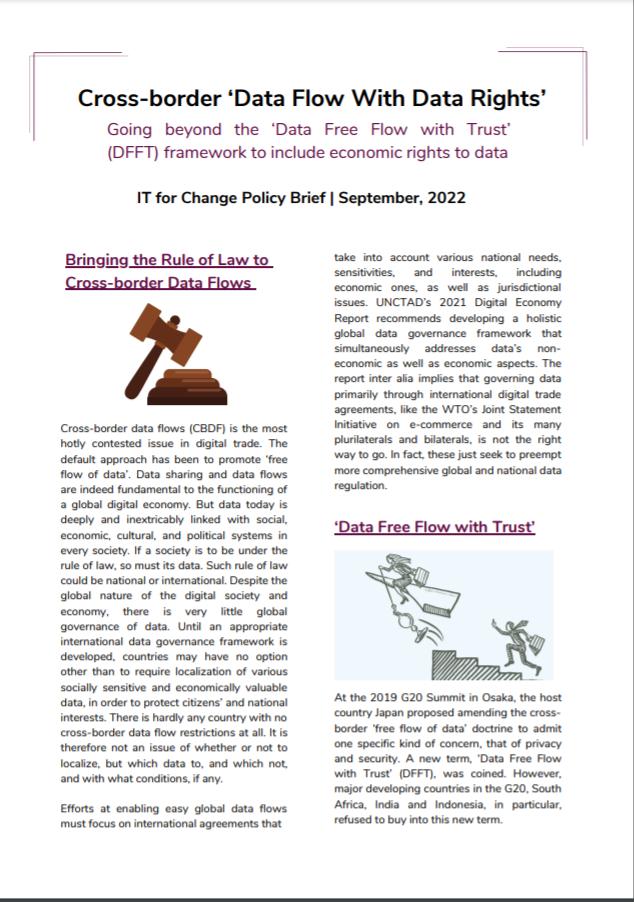

We mainstreamed feminist perspectives on platform regulation.
With InternetLab, we co-organized a virtual roundtable in April 2022, bringing together scholars and thinkers to re-imagine social media governance from a feminist perspective. Acknowledging that viral hate in algorithmically mediated environments requires fresh thinking on free speech theories, the effort charted a fresh, feminist approach to platform regulation.
We were able to leverage these insights and co-shape UNESCO’s ‘Guidelines for Regulating Digital Platforms to Safeguard Freedom of Expression and Access to Information’. The Guidelines reflect our assertion that platforms must be held accountable not only for the impact of their content moderation function on freedom of speech and access to information, but also for the impact of their content curation function.
We also participated in deliberations of the Working Group on the Pluralism of Information in Curation and Indexation Algorithms convened by the Forum on Information and Democracy, where we stressed the need to go beyond a choice-centric approach and make platform recommender systems sensitive-by-design to diversity and plurality of content. We are pleased to see our contributions reflected in the report from the group, which came out in February 2023. The report also voiced our concern that platform recommender systems can hinder individual autonomy and have a long-term impact on the ability of users from marginal social locations in exercising their voice.
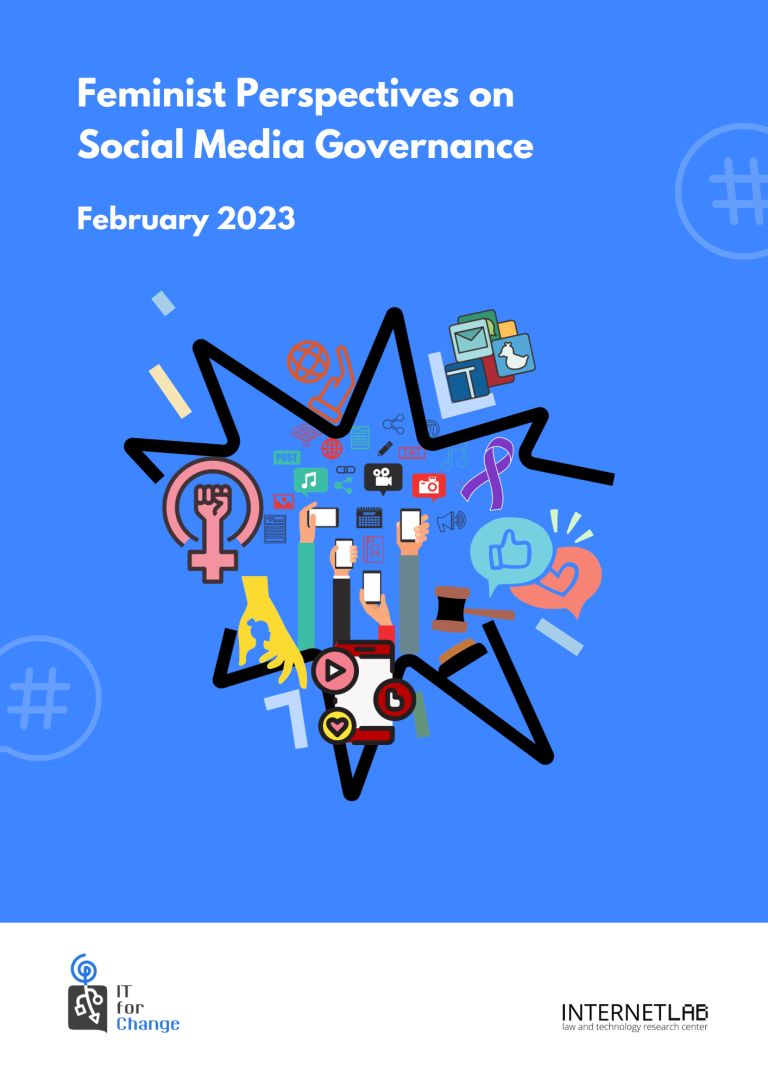

We initiated a unique public AI program in education.
The state of Kerala in India uses a digital multimedia library to augment English language learning in its public education system – the E Language Lab. Teachers and education officials of the Kerala Infrastructure and Technology for Education (KITE) unit felt that it would be very useful to develop an AI tool for oral assessments that could be linked to the Lab, in order to enhance the effectiveness of focused classroom interventions.
In collaboration with the Regional Institute of English, South India, we conducted a longitudinal impact study of the English Language Lab, which helped us identify potential use cases for the AI assessment tool. We demonstrated a Free and Open Source (FOSS) ‘speech-to-text’ AI use-case that can potentially assist teachers with assessments. This year, we will proceed to a formal proof of concept phase covering six schools in three districts.

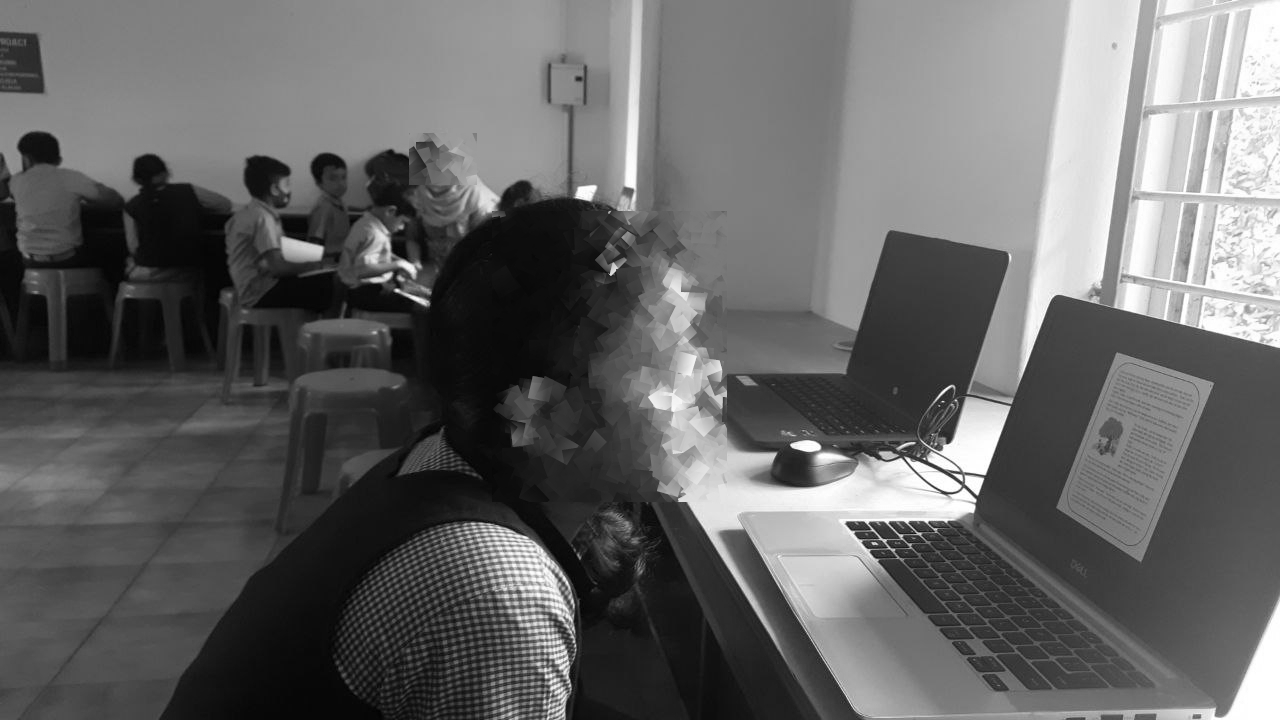
This is an ambitious undertaking that seeks to evolve a unique public-community partnership for AI development in the education sector, centering the larger public interest and furthering progressive educational aims, rather than procuring proprietary ed-tech from vendors. The Language Lab is an excellent example of public sector software innovation, and our impact study concluded that it has had a significant impact on students’ English communicative skills. Since the Lab itself is licensed under FOSS, it can freely be used by other state governments as well.
2
Re-centering Community
The promise of digital technologies for development can be realized only when technological affordances and social practices intersect in specific cultures of use that benefit marginalized communities. In our work with adolescent girls, rural women’s collectives, and students from marginalized backgrounds in the public education system, our in-depth knowledge of techno-social grammars has catalyzed communities of practice that further individual and collective empowerment.

We enabled adolescent girls to engage confidently with digital media.
The pandemic resulted in a spike in the marriage of underage girls in Karnataka, with a large proportion of families being unable to take care of their daughters’ basic needs and safety. Through our program, Hosa Hejje, Hosa Dishe (H2HD - New Steps, New Directions), we explored tech-enabled empowerment strategies that can enable adolescent girls to successfully realize their right to education and self-determination, and avoid succumbing to familial and community pressure for early marriage.
Recognizing the value of systemic support, we entered into a formal collaboration with the Government of Karnataka’s Department of Primary and Secondary Education to set up in-school safe spaces, or Kishori Clubs. The Kishori Clubs are facilitated by female teachers trained by the H2HD team, to transact a digital media-based curriculum, specifically designed keeping in mind the needs of adolescent girls. The program directly engages with 673 adolescent girls, and indirectly covers 11,440 girls through active engagement with teachers and parents.
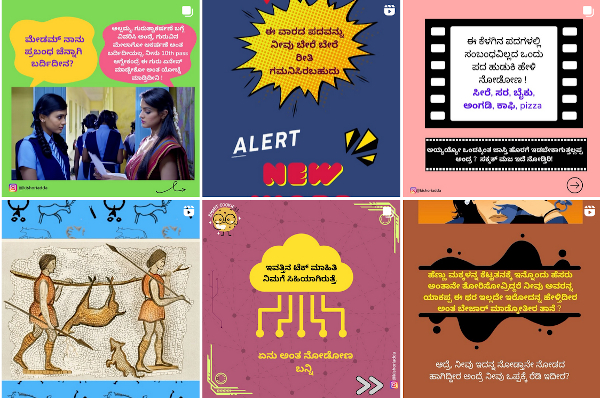
H2HD AT A GLANCE
| 146+ | Kishori Clubs |
| 45+ | Resources created in the form of modules, help sheets, DSTs, and flip books. |

We designed and implemented a path-breaking inclusive education program.
Inclusive education approaches in the classroom have become more critical than ever, as the prevalence of learning difficulties in children has aggravated due to pandemic-triggered school closures. To address this imperative, we designed and deployed a year-long program (April 2022 to March 2023) for students in classes VI-IX studying in South Bengaluru government and government-aided schools in the domains of language, science and mathematics. We focused on differentiated instruction in collaboration with the teachers – incorporating multilevel, multilingual, multimodal, and multisensory resources and pedagogies, leveraging FOSS learning tools such as PhET, GeoGebra, and TuxMath. The endline assessment of the program showed significant improvement in learning outcomes among program participants.
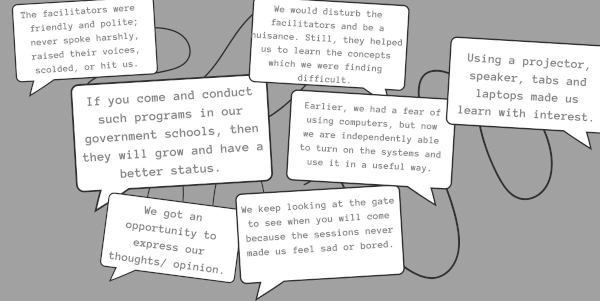

We strengthened local information and knowledge cultures to support women’s claims-making.
Our field center, Prakriye, runs seven internet-enabled community information centers in partnership with local women’s collectives, facilitating their access to public information, welfare entitlements, and public services in over 60 villages in rural Mysuru, Karnataka. In the village of Tumbasoge, during a session on women’s rights, the sakhi (young woman infomediary associated with the information center) spoke to the women about the Mahatma Gandhi National Rural Employee Guarantee Act (MGNREGA) scheme under which one is entitled to 100 days of work, and a daily wage of INR 309 (USD 4). After hearing this, one of the women participants exclaimed, “I had no idea about the job card (eligibility document for the scheme).” Meanwhile, another participant added, “I have a job card, but did not know its benefits. I thought this was just like any other [identity] card.” The scheme also guarantees men and women equal pay.
Inspired by the discussion, within a week, nine women collectively went to apply for a job card at the information center. There, they also learnt about the free bus pass, which allows women to travel up to 40 kilometers for free in the state, and about first-aid kits available for job cardholders. “We came here to apply for a job card, but also applied for the bus pass and got first-aid kits. These are beneficial for us daily-wage workers. We should visit the center more often to gain benefits that are meant for us,” one of the participants said.
3
Re-imagining Rights
The mainstream digital rights discourse tends to frame rights in individualistic terms, ignoring the interplay between individual freedoms and social structures that shape choice. Our work attempts to re-imagine human rights as both individual and collective affordances, freedoms that obtain from both enhanced autonomy and capabilities that improve life-chances. This year, we pushed for an expanded idea of data rights beyond individual privacy in the Organisation for Economic Co-operation and Development (OECD) policy debates on corporate due diligence; urged workers’ organizations and policymakers to account for data rights in the platform workplace; and exhorted civil society groups at the 67th UN Commission on the Status of Women (UN CSW67) to move beyond demands for inclusion towards an agenda of structural change that paves the way for systemic responses to equity and diversity.

We brought data justice center-stage in the OECD debate on corporate due diligence frameworks.
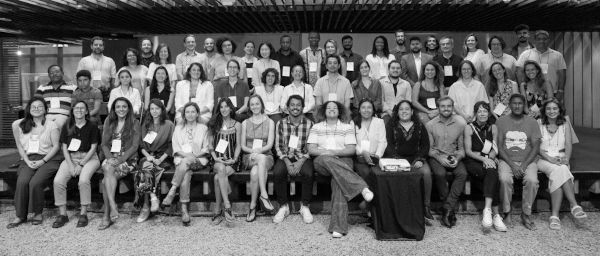
This year, we worked closely with members of the global civil society alliance, OECD Watch, to shape inputs into the official public consultations on the revision of the ‘OECD Guidelines on Responsible Business Conduct of Multinational Enterprises’. Our recommendations demanded a sharper articulation of digitalization and datafication of value chains in the Guidelines, highlighting the inadequate attention to data harms.
Although the Guidelines did not go much beyond tackling privacy risks, we managed to bring new thinking to the debate – including, about corporate accountability for algorithmic discrimination, exploitation, and exclusion; facilitation and amplification of violence; manipulation of democratic processes; spread of misinformation; risks associated with dual-use technologies, that is technology with both civil and military application; and environmental impacts of technology.

We put workers’ data rights front and center in the gig economy debate.
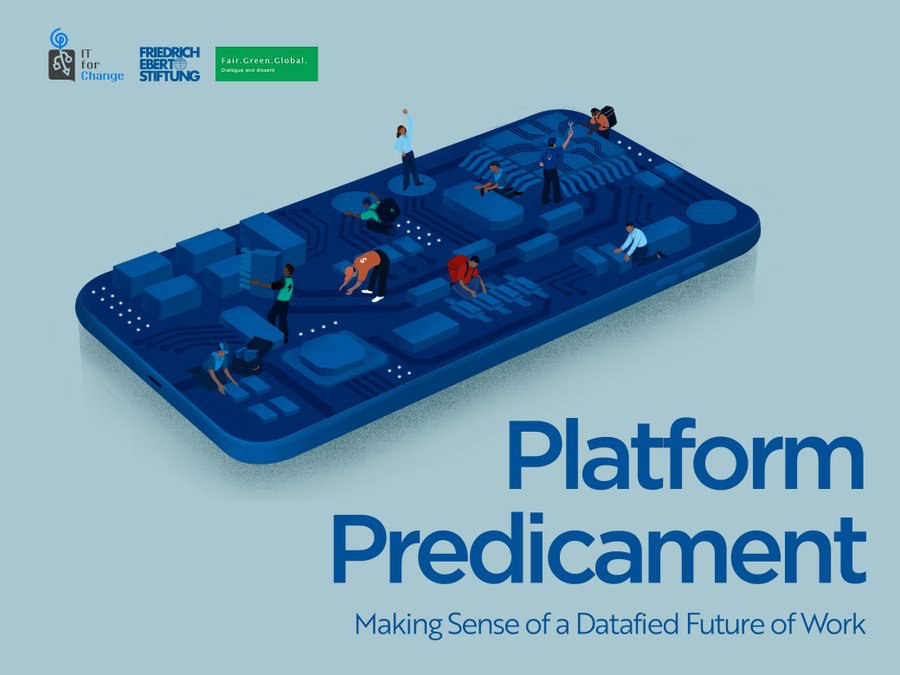
Some of the critical issues identified by the paper were taken forward through a podcast series titled, ‘Platform Predicament’, launched in December 2022 that featured interviews with labor economy researchers, platform workers, and platform founders. As a result of these efforts, we were approached by the National Law School of India University (NLSIU), Bengaluru, to provide expert input on specific regulatory provisions for algorithmic governance in platform workplaces. This work will directly feed into Karnataka state’s proposed legislation for ride-hailing and food delivery sectors.
In June 2022, we published a cutting-edge analysis of workers’ data rights, making a strong case for on-boarding new risks to decent work in platformized workplaces. While freedom from surveillance is recognized by national and international frameworks, a whole host of data rights, including those implicating algorithmic management of workers, are missing in the debate. We have taken our analysis into capacity-building programs of trade unions such as Public Services International (PSI), our engagement with the ILO, and with national-level organizations and academics working on gig economy regulation in India.


We galvanized a Declaration on Feminist Digital Justice, taking it to the outcomes of UN CSW67.
Between August 2021 and December 2022, along with Development Alternatives with Women for a New Era (DAWN), we convened a working group of 36 feminist scholar-practitioners from the Asia-Pacific, Latin America and the Caribbean, and Africa to deliberate upon and delineate a gender-just digital future. The group’s discussions over the course of several months generated the Declaration of Feminist Digital Justice.
The central pillars of this Declaration are: a digital economy based on social and solidarity enterprise models that equitably distribute data value, a digital society based on reciprocity and solidarity, a digital state grounded in a feminist social contract, and a new democratic digital constitutionalism that furthers the right to development of the peoples of the Global South.

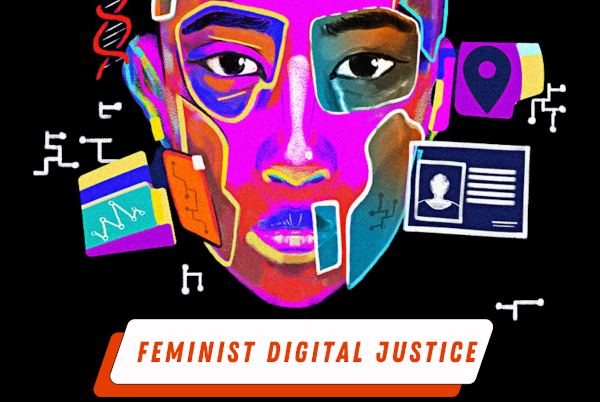
On 6 March 2023, we launched the Declaration at UN CSW67, the first-ever CSW to focus on digital technologies and gender equality as a priority theme, and in just a week, the Declaration received over 1,000 views!
Channeling the spirit of the Declaration, we also contributed an expert paper to the CSW and made numerous inputs to the text of the Outcomes Document, arguing the place of public digital innovation. We underlined how market-led connectivity and design solutions cannot deliver on gender equality unless the innovation ecosystem is imagined as a public good in the first place.
4
Re-claiming the Narrative
Majority world perspectives are under-represented in the trajectories of digital innovation and the leading edge of digital policy discourses. Using our convening power, we joined hands with progressive civil society actors and people’s movements to lead from the South – raising our voice against neo-colonial digital trade policy regimes, bringing the perspective of the 99% on the extractivist Big Tech paradigm to the table, foregrounding a Southern narrative of digital justice in the ongoing negotiations on the UN Global Digital Compact and building advocacy and research capacities of Southern civil society on digital issues.
We put up a powerful resistance to the dominant digital trade agenda.
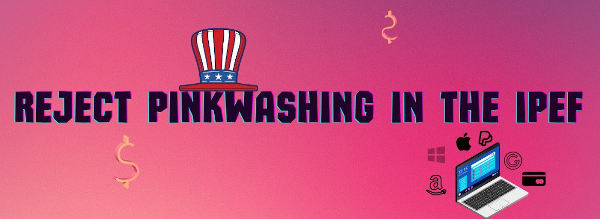
For a few years now, we have been working actively with civil society actors, researchers, and trade union activists to push back against Big Tech’s efforts to rewrite the rules for the digital economy through its influence in international trade negotiations. Our efforts saw some critical successes this year.
For one, labor groups who engaged with the workshops and sessions we anchored at the UNCTAD eCommerce week 2022, called for a rejection of ‘plurilateral’ initiatives on e-commerce – essentially, an effort by a select group of wealthy nations to circumvent the rules-based processes of the WTO through extra institutional arrangements – in the lead-up to the WTO ministerial. Registering a strong protest against the hegemony of some countries at the WTO’s 12th Ministerial Conference in Geneva, we participated in a much-publicized ‘die-in’ protest.
We co-led a feminist campaign with the Third World Network (TWN), PSI, Gender and Trade Coalition, and other groups to call out the pink-washing tactics in the ‘Upskilling Initiative for Women and Girls’ launched as part of the Indo-Pacific Economic Framework for Prosperity (IPEF). Our campaign was a huge success, with our statement receiving 60+ endorsements from organizations globally.

And…we continued to set the agenda on digitalization for the 99%
Since its launch in October 2021, DataSyn, our newsletter covering the impact of the Big Tech business model on people and the planet with a special focus on the Majority World, has been growing from strength to strength. In 2022-23, we published 12 issues with over 68 unique contributors, reaching a global readership base of 18,000+ readers. This year, we focused on a range of topical and slow burn issues, including Big Tech developments, Web 3.0, digital economy regulations, trade and e-commerce, gender in the digital economy, labor rights, food security, fintech, edtech, and more. Our newsletter is now being read in more than 25 countries, reaching strategically placed allies and advocates from various constituencies.
We also brought out our flagship State of Big Tech Compendium in November 2022, featuring 20 key voices from research, advocacy, policy, and civil society, offering their takes on the current digitalization landscape and the way forward. The compendium was widely read and shared, garnering over 7400+ views. It was covered by Lynn Fries from the Global Political Economy, in a short video reaching influential financial/economics news and analysis aggregators.
Some key essays were also cross posted by the Transnational Institute, in its State of Power Report in January 2023. Critically, the State of Big Tech compendium has served as a significant advocacy and knowledge resource and furthered capacity development with our allies and partners.
Check our most read piece from the year, ‘The Nth Rooms and the Ungovernable Digital Bodies’.
Interest piqued? All our past issues to date are available on Substack. Check them out here!
DATASYN AT A GLANCE
| 12 | issues |
| 30+ | contributors |
| 2,300+ | loyal readers |
| 50% | opening rate |
| 10+ | countries reached |
| 18,000+ | new readers on Bot Populi |
| 30+ | articles published |
| 34,500+ | article views on Bot Populi |
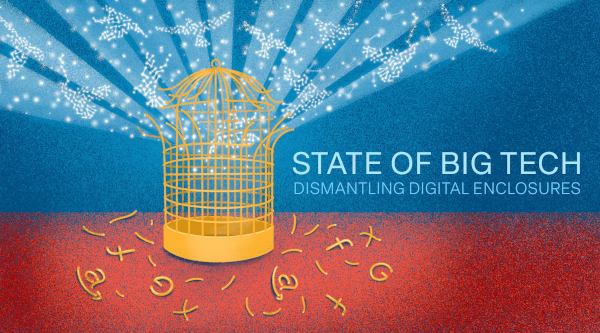

We brought Southern frames into the ongoing consultations on the UN Global Digital Compact.
The UN consultations on the proposed Global Digital Compact (GDC) are a critical milestone in international digital cooperation. This year, we brought our networks and partners onto a common platform – the Global Digital Justice Forum – to make a dent in this important process. Through several months of dialogue, deliberation, and consultation with several communities in the Global South, we co-constructed submissions for the UN’s open consultation and deep dive sessions.
In addition, we also co-led a process to evolve a feminist charter of demands from the Global South through consultations with nearly 100 feminist academics, scholar-practitioners, activists, civil society representatives, and trade unionists working closely with the Asia-Pacific Forum on Women, Law and Development (APWLD), Access to Knowledge for Development Center at the American University in Cairo, Research ICT Africa, FES Berlin, and FES Regional Trade Union Project in Latin America and the Caribbean. This charter of demands, released at UN CSW67, generated a buzz, and was the first to have gathered feminist views on the GDC agenda.

We nurtured Southern leadership on digital issues.
Big Tech impunity has triggered public concern worldwide. Recognizing the importance of nurturing this groundswell, we organized a residential institute for emerging civil society leaders titled, ‘Frames and Frontiers for a New Digitality’. The institute was held from 30 January to 3 February 2023 in Chiang Mai, Thailand, as part of IT for Change’s School of Digital Justice, a pedagogical vehicle to further the vision of re-imagining and realizing socio-structural transformation for a just digital economy. It sought to provide participants with the necessary vocabulary and tools to appropriately frame and approach emerging digital intersections with their work, as well as develop strategies for effective political organization.
It is a testament to our credibility in the space that over 150 applicants applied to be part of this opportunity, with the applicant pool including several digital experts in their own right who sought the institute out to capstone their knowledge with development-oriented perspectives. From this pool, we brought together 27 participants (all either working on or from the Global South) from 14 countries across Asia-Pacific, Latin America, and Africa in an intense week-long program of sessions and activities designed to expand their learning and capacities to engage with digital issues, and facilitate longer term South-South alliances and solidarity-building.
The institute was a resounding success, with participants taking away a rich plethora of learnings and connections from the gathering. In addition to being evaluated highly by the participants, we are pleased to report that it was showcased as a case study for exemplary capacity-building as part of the mid-term review of the Fair, Green and Global Alliance that we are a part of. Our alliance partners from the Fair, Green, and Global Alliance, Transnational Institute, and Samadhana Institute also joined the institute as participants.
We were also glad to have our allies and partners from the digital rights and development communities, including from LirneAsia, TWN, ETC Group, SOMO, Oxford Internet Institute, PSI International, University of Western Australia, Just Economy and Labor Institute (JELI), and many more, who generously shared their time and expertise as resource persons, recognizing the vital nature of the intervention.
The first round of our research fellowship program for early career women scholars on gender and the digital economy in India, initiated in 2021 with support from the European Commission, came to a successful close. All 10 research fellows submitted their final papers, which were published after a peer review process in late 2022. We also undertook a social media launch of the compendium of research synopsis, which received considerable traction. We consider this a critical contribution to expanding the nascent domain of feminist scholarship on the digital in the Majority World.
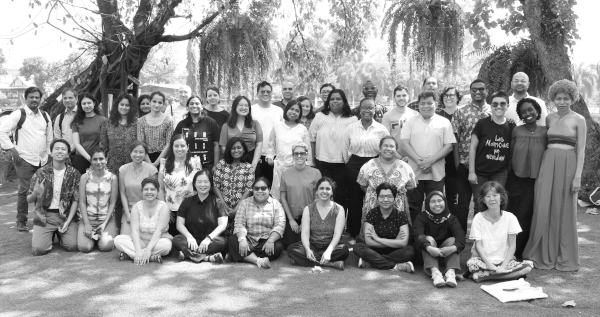
Event Highlights
In the past year, we have been involved in key global policy events, convened critical roundtables and institutes, and been part of conferences and webinars to contribute key messages on digital justice in its many forms. Here are some highlights:
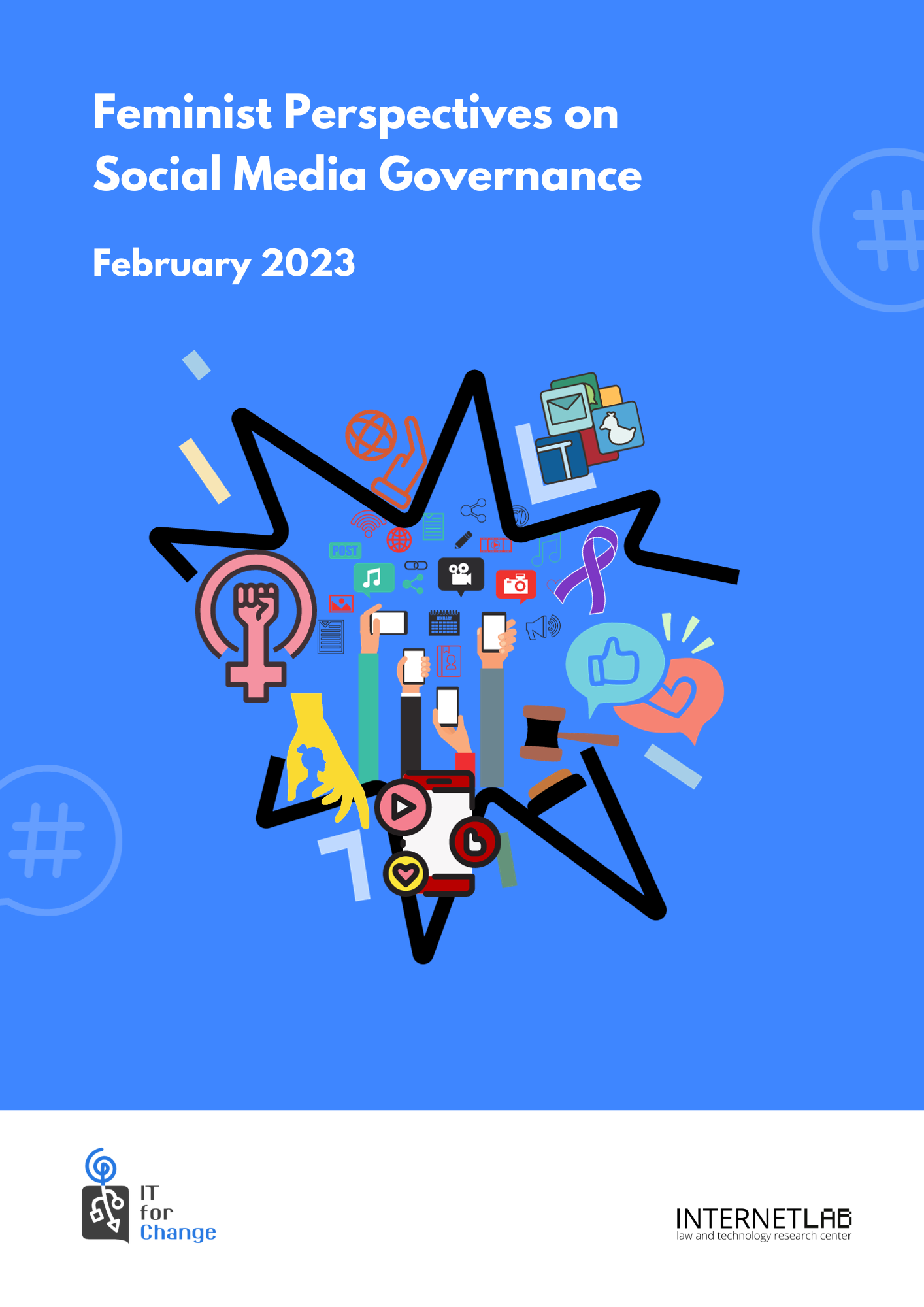
Read a curated compendium of essay submissions from participants.
Roundtable on Feminist Perspectives on Social Media Governance
18-21 April 2022
To deepen our understanding of how women's first-order right to participation can be reclaimed in the platformized publics of the internet age, we co-organized a roundtable with InternetLab. The aim of the roundtable was to catalyze a productive debate revolving around the central question: What new imaginaries of social media governance will be adequate to eradicate the unfreedoms arising from misogyny in online communications agora? During the four-day event, we brought together 20 academics, lawyers, digital rights activists, and scholar-practitioners committed to feminist politics, to collectively reflect on, discuss, and debate this question, in order to weave a rich tapestry of perspectives on future directions for social media governance.
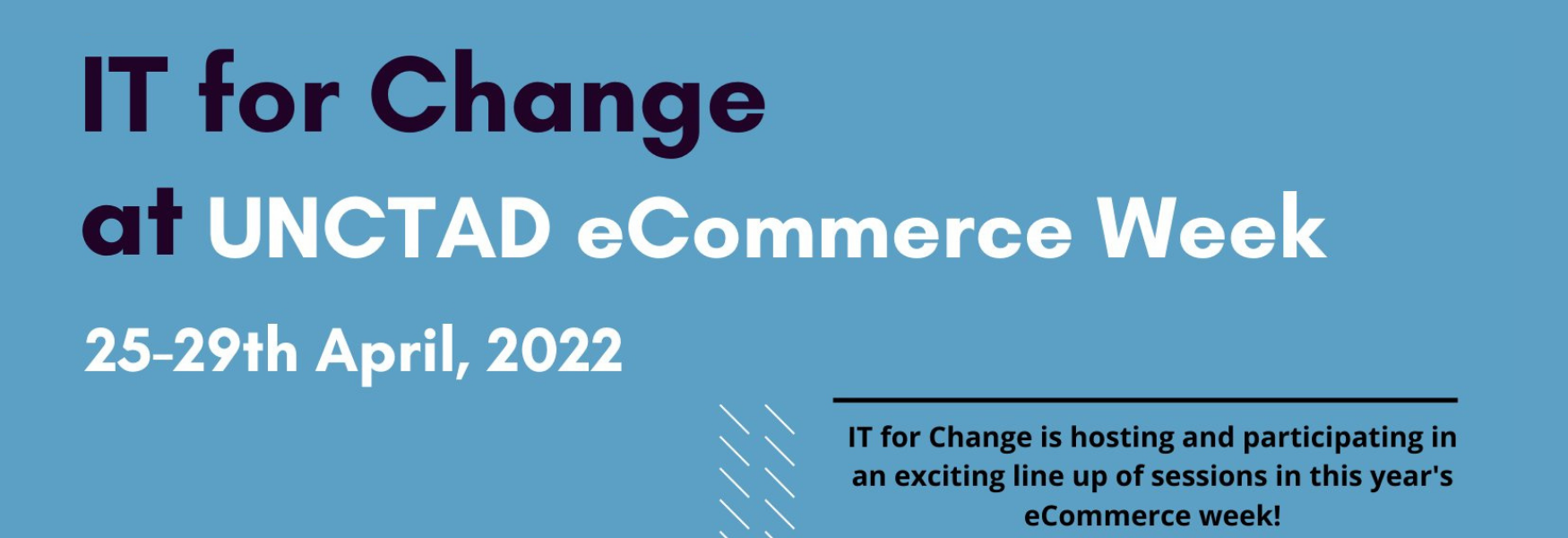
Know more about our sessions.
IT for Change at UNCTAD eCommerce Week
25-29 April 2022
At IT for Change, we are constantly working towards building more resilient and inclusive societies to ensure that the Global South benefits from the digital economy and the latest developments in the e-commerce space. To this end, we hosted and participated in an exciting line-up of sessions at the 2022 UNCTAD eCommerce Week. Our sessions covered a wide range of topics ranging from data value in the information economy to designing a global framework for data governance.
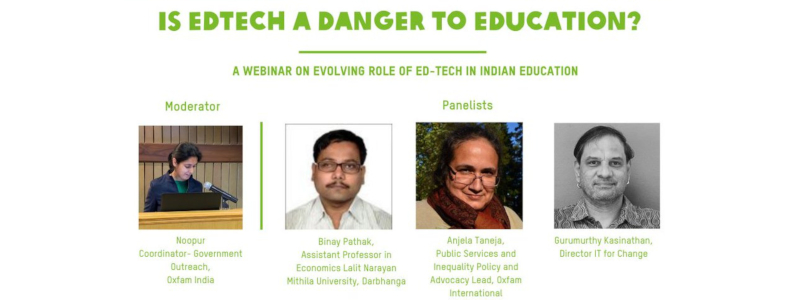
Tune into the session recording.
Is EdTech a Danger to Education?
23 December 2022
The recent burgeoning of EdTech platforms has necessitated a deeper understanding of the possibilities, benefits, and dangers of EdTech, as well as a critical evaluation of its role in supporting different aspects of teaching-learning. To facilitate a discussion on these issues, we co-organized a webinar in collaboration with TISS, Oxfam India, and the National Coalition on Education Emergency.
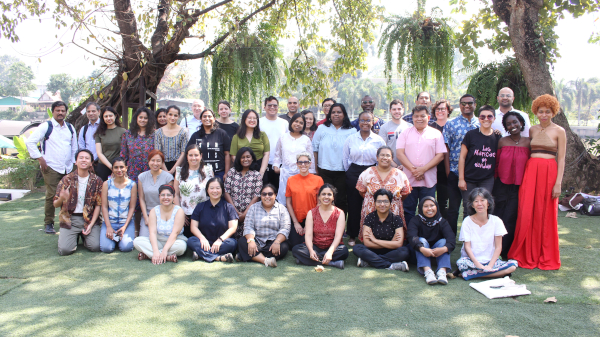
Know more about the institution.
Institute on Frontiers and Frames for a New Digitality
30 January-3 February 2023
As part of our efforts to transform emerging civil society engagement with digital issues into a lasting global movement for change, we organized a five-day residential institute in Chiang Mai, Thailand. The institute aimed to equip civil society actors with the necessary vocabulary and tools to effectively address the emerging digital landscape and develop strategies for political organization. It brought together 27 participants and 10 + resource persons from over 20 countries.
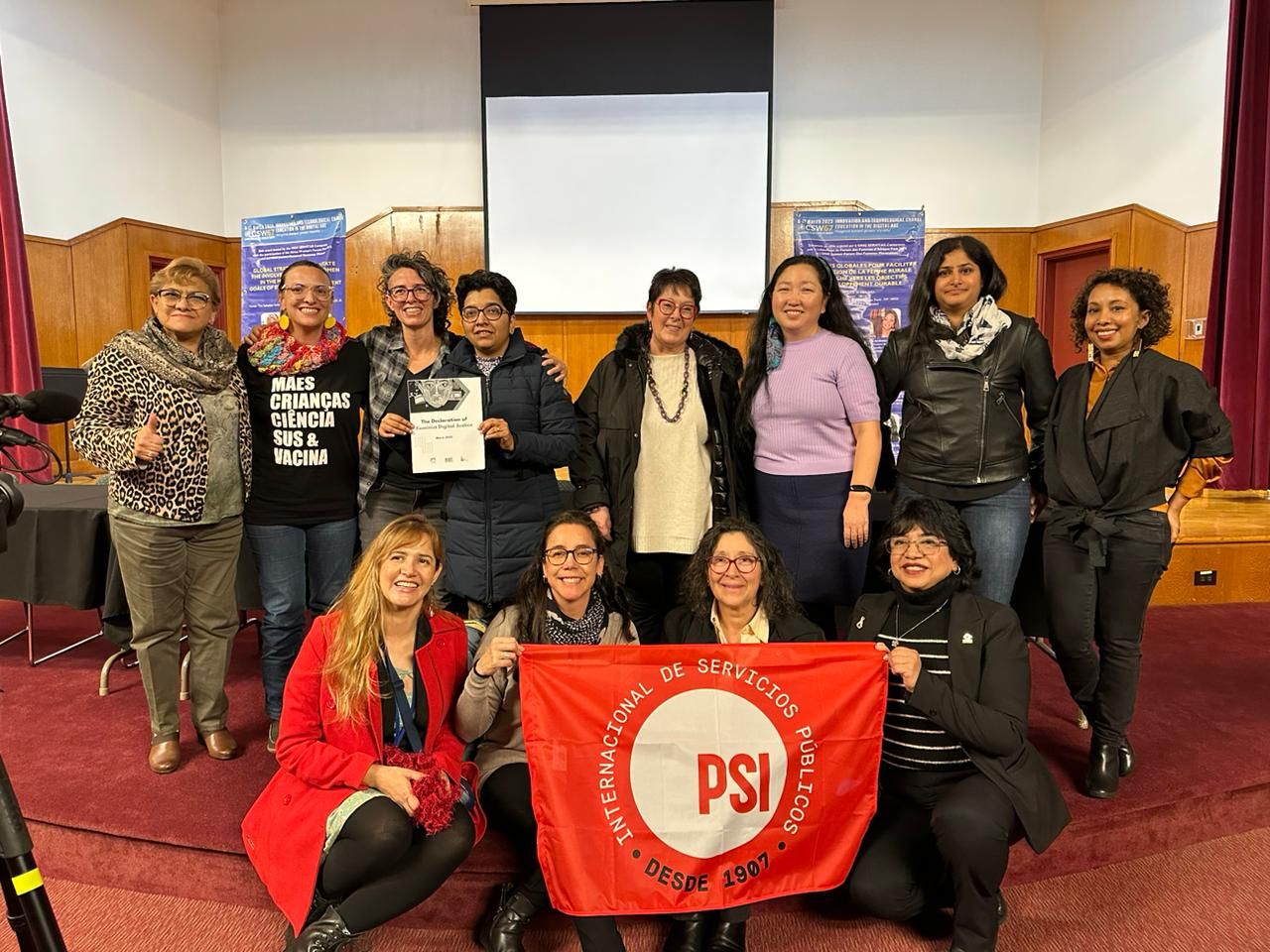
Read our submissions to the Commission.
IT for Change at the 67th UN Commission on the Status of Women (UN CSW67)
5-15 March 2023
To expand our work on feminist digitality, we hosted and participated in a diverse lineup of sessions during UN CSW67. These events included conversations with numerous feminist scholars and experts, including the Head of UN Women, the launch of our Declaration of Feminist Digital Justice, and panel discussions on various topics ranging from feminist development policy to a global digital compact for gender justice.
Collaboration Footprint
We have worked alongside, and are associated with 100+ CSOs, academic institutions, union federations, private-sector entities, and government and multilateral bodies across the globe. Here is a glance at our list of collaborations for the year:
National
- Arghyam
- ASHA
- Bharatiya Krishak Samaj
- Breakthrough India
- Center for Health and Social Change
- Centre for Internet and Society
- Digantar Shiksha Evam Khel Khud Samiti
- Gig Workers Association of India
- Gyan Vigyan Samiti, Jharkhand
- Hawkers Joint Action Committee
- Internet Freedom Foundation
- Mazdoor Kisan Shakti Sangathan
- Oxfam India
- Tattle Civic Technologies
- Sathya Educare Competency Trust
- Tamil Nadu Science Forum
Asia-Pacific
- Asia Pacific Forum on Women, Law and Development (APWLD)
- ETC Group
- Focus on the Global South
- IBON International
- Just Economy and Labor Institute
- Khazanah Research Institute
- Konfederasi Pergerakan Rakyat Indonesia (KPRI)
- Lirne Asia
- Samadhana Institute
- Third World Network (TWN)
- Vietnam Organization for Gender Equality (VOGE)
Africa & MENA
- Africa Open Data and Internet Research Foundation
- AfronomicsLaw Forum
- Arab NGO Network for Development
- Poliicy
- Research ICT Africa
- Southern and Eastern Africa Trade Information and Negotiations Institute (SEATINI)
North America
- Centre for Innovation and Governance (CIGI)
- Drivers Coopeative
- Public Citizen
Europe
- Centre tricontinental (CETRI)
- Clean Clothes Campaign (CCC)
- Diplo Foundation
- Food First Information and Action Network (FIAN)
- Groupe de Recherche Pour Une Stratégie Économique Alternative (GRESEA)
- The Centre for Research on Multinational Corporations (SOMO)
- Transnational Institute (TNI)
- Whynot Lab
Latin America
- Data Impacta
- Equidad
- Instituto de Estudios Ecuatorianos
- InternetLab
- Latin American Information Agency (ALAI)
- Mora Research Institute
- Social Watch
Global
- Civil Society Group on Financing for Development
- Commonwealth of Learning
- CONCORDE Europe
- Forum on Information and Democracy
- Gender & Technology Institute
- Global Digital Inclusion Partnership
- GRAIN
- MediaLab
- Open Knowledge Foundation
- People’s Health Movement (PHM)
- Indian Federation of App-based Transport Workers (IFAT)
- International Trade Union Confederation (ITUC)
- International Transport Workers Federation (ITF)
- Public Services International (PSI)
- UNIglobal
- Commonwealth of Learning (COL)
- Directorate of State Education Research and Training (DSERT), Karnataka
- European Union
- Global Partnership on Artificial Intelligence
- Human Resources Development Centre, University of Calicut
- International Labour Organization
- Karnataka Residential Educational Institutes Society (KREIS)
- Kendriya Vidyalaya Sanghatan
- Kerala Development and Innovation Strategic Council (K-DISC), Government of Kerala
- KITE (Kerala Infrastructure and Technology for Education), Government of Kerala
- Ministry of Rural Development, Government of India
- Ministry of Foreign Affairs, Netherlands
- National Human Rights Commission, Government of India
- NITI Aayog
- (Philippines) Department of Information and Communications Technology
- Regional Institute of English,South India (RIESI)
- SCERT and Samagra Shiksha Tamil Nadu
- South Centre (G-77)
- State Council of Educational Research and Training (SCERT), Telangana
- UN STI Forum
- UNCTAD
- UNESCO
- UN Special Rapporteur on the Freedom of Expression
- UNWOMEN
- Indian Software Product Industry Round Table (ISPIRT)
- LabourNet
- Sewa Cooperative Federation
- Vrutti
- A.T.E Chandra Foundation
- Bill and Melinda Gates Foundation
- British Telecom
- Cognizant Foundation
- Edelgive foundation
- European Commission
- Ford Foundation
- Friedrich Ebert Stiftung
- IDRC Canada
- Internet Society Foundation
- Kotak foundation
- Ministry of Forieign Affairs, Netherlands
- Tony Blair Institute for Global Change
- Access to Knowledge for Development Centre (A2K4D), American University of Cairo
- BES College of Teacher Education, Bengaluru
- Center for Excellence in Teacher Education (CETE), Tata Institute of Social Sciences
- Christu Jayanti College
- Comparitive Education Society of India (CESI)
- Institute of Development Studies (IDS)
- Institute of Social Studies Trust (ISST)
- London School of Economics
- Montfort Group of Institutions
- NLSIU, Bangalore
- NMKRV College for Women, Bengaluru
- Open Data Institute
- Regional Institute of English, South India (RIESI)
- Sri Sarvajna College of Education (SSCE), Bengaluru
- The New School
- Tilburg University
- University of Calicut
- University of Manchester
- University of Melbourne
- University of Sao Paulo
- University of Western Australia
- Vijaya Teachers College (VTC), Bengaluru
Networks
We also anchor, and are closely involved with various policy, advocacy, and research networks on global digital justice issues. Here is a glance at the key networks we are part of:
APRCEM South Asia Working Group
Campaign of Campaigns
Data Governance network (DGN)
Development Alternatives with Women for a New Era
Fair Green and Global Alliance
EdTech Watch
Gender and Trade Coalition
Global Digital Justice Forum
Global Policy Forum
Global Trade Justice Network
Global Partnership on Artificial Intelligence
Joint Action Committee Against Foreign Retail and E-commerce (JACAFRE)
Just Net Coalition (JNC)
Make Amazon Pay
National Coalition on Education Emergency (NCEE)
Our World is not for Sale (OWINFS
OECD Watch
People’s Working Group on Multistakeholderism (PWGM)
Platform Cooperativism Consortium
Platform Governance Research Network (PGRN)
RTE ForumRight Digitalisation Network
Transform Health Coalition
Projects & Publications
The Essential IT for Change Resource List: 2022-23
RESEARCH REPORTS
The Future of Work We Seek: A Philanthropic Agenda for Workers and the Digital Economy. Anita Gurumurthy, Deepti Bharthur, and Amay Korjan.
State of Big Tech 2022: Dismantling Digital Enclosures. IT for Change.
Longitudinal Impact Study on the Kerala E-Language Lab. IT for Change in collaboration with the Regional Institute of Education, South India.
FROM THE PRESS
What a Withdrawn Karnataka Memo Seeking Rs 100 from Parents says about Education Funding in India in Scroll. Gurumurthy Kasinathan.
Digital Transformation for Gender Equality: Will ‘Inclusion’ and ‘Diversity’ Alone Get Us There? in Bot Populi. Anita Gurumurthy and Nandini Chami.
JOURNAL ARTICLES
Musk’s Twitter Acquisition: Out of the Frying Pan into the Fire in Economic and Political Weekly. Gurumurthy Kasinathan.
Taming the Intelligent Corporation: Why the Data Paradigm Necessitates a Re-think of Responsible Business Conduct Obligations of MNEs in Multinationales: En finir avec l’impunité? Anita Gurumurthy and Nandini Chami.
Special issue on Digital Technologies and Education in Shiksha Vimarsh. Edited by IT for Change.
EVENT REPORTS
The Digital Ecosystem Opportunity for Indian Agriculture: Making the Right Choices, observations from a workshop. Sakhi Shah and Ranjitha Kumar.
Unlocking the Platform Dividend for the Indian Economy, notes from a policy roundtable on NITI Aayog’s roadmap for an inclusive future of work. IT for Change.
FROM THE DATASYN VAULT
Dismantling Digital Enclosures: Reflections from the State of Big Tech. Deepti Bharthur, Amay Korjan, and Shreeja Sen.
Gender-based Abuse on the Metaverse: The New Internet is Being Coded on a Toxic Palimpsest. Merrin Muhammed Ashraf.
PODCASTS
Platform Predicament: Making Sense of a Datafied Future of Work, hosted by Sonakshi Agarwal.
ADVOCACY STATEMENTS
Statement Rejecting Pinkwashing in the Indo-Pacific Economic Framework. IT for Change and allies.
NCEE Urges Due Diligence by Government of Andhra Pradesh Before Implementing MoU with BYJUs. IT for Change and allies.
NOTES FROM THE FIELD
What it Takes to Maintain Access to the Digital: Experiences of Adolescent Girls in Rural Mysuru. Nayana Kirasur.
POLICY BRIEFS
Cross-Border ‘Data Flow With Data Rights’. Parminder Jeet Singh.
Innovation to Tackle Gender Inequality: A Back-to-Basics Roadmap. Anita Gurumurthy and Nandini Chami.
Workers’ Data Rights in the Platformized Workplace - A New Frontier for the Labor Agenda. Anita Gurumurthy, Nandini Chami, Sreyan Chatterjee, and Sakhi Shah.
POLICY SUBMISSIONS
Rajkumar, M., Ashraf, M. M., & Gurumurthy, A. (2023). Response from IT for Change to the Draft 2.0 UNESCO Guidelines for Regulating Digital Platforms. IT for Change.
BLOGS
Declaration of Digital Rights and Principles: A Reality Check in Concorde Europe. Anita Gurumurthy.
FORTHCOMING
Forging a Survivor-Centric Approach to Online Gender-Based Violence: A Judicial Resource Guide. IT for Change.
Unskewing the Data Value Chain. IT for Change.
Projects Overview
Assessing the AI Moment from a Global South Perspective
(2022-current)
Centering Women in the Digitalizing Economy
(2020-2024)
Data Governance Network
(2019-current)
Fair, Green and Global (FGG) Alliance
(2021-2025)
- State of Big Tech Report
(2021-current)
- Digital Economic Integration of MSMEs in the Global South
(2022-current) - DataSyn Newsletter (2021-current)
- Big Tech & Society Media Fellowships (2022-current)
Feminist Digital Justice
(2019-current)
Future of Rights and Citizenship in the Digital Age
(2020-2023)
Hosa Hejje Hosa Dishe
(2019-2022)
IT for Change under BUILD
(2021-2022)
Namma Maatu Namma Jaaga, Phase II
(2020-2023)
Recognize, Resist, Remedy: Addressing Gender-Based Hate Speech in the Online Public Sphere
(2019-2022)
Reform the Gig: Research and Advocacy on Platform Workers’ Rights in India
(2020- current)
School of Digital Justice
(2022-current)
The Feminist Observatory of the Internet
(2020-current)
Towards Gender Just Public Information System Design
(2021-current)
Transforming School Education through ICT Integration
(2022-2023)
Financial Statements
BALANCE SHEET AS ON 31 MARCH 2023
All amounts are in INR (rounded)
| 2021-22 | Liabilities | 2022-23 | % of total | 2021-22 | Assets | 2022-23 | % of total |
|---|---|---|---|---|---|---|---|
| 31,144,106 | Organisation Stabilisation Fund | 39,447,696 | 22 | 2,799,471 | Fixed Assets | 2,661,069 | 1.5 |
| 240,000 | Corpus Donation | 270,000 | 0 | 103,374,048 | Current Assets, Loans and Advances | 175,461,357 | 98.0 |
| 21,680,345 | General Fund | 26,491,576 | 15 | 935,778 | Receivables | 795,428 | 0.5 |
| 2,799,471 | Asset Fund | 2,661,069 | 1 | ||||
| 44,638,968 | Advance Account | 103,719,163 | 58 | ||||
| 6,606,407 | Sundry Payables | 6,328,350 | 4 | ||||
| 107,109,297 | Total | 178,917,854 | 100 | 107,109,297 | Total | 178,917,854 | 100 |
INCOME AND EXPENDITURE ACCOUNT FOR YEAR ENDED 31 MARCH 2023
All amounts are in INR (rounded)
| 2021-22 | Expenditure | 2022-23 | % of total | 2021-22 | Income | 2022-23 | % of total |
|---|---|---|---|---|---|---|---|
| 37,257,090 | Personnel Costs | 44,152,997 | 59 | 51,848,396 | Funds Received | 64,647,410 | 86 |
| 10,915,101 | Operating Costs | 15,501,548 | 21 | 5,220,667 | Interest on Term Deposit & Savings Bank Account | 5,385,875 | 7 |
| 3,268,931 | Administration Costs | 4,397,514 | 6 | 1,043,553 | Income to the extent of Depreciation transferred from Asset fund | 1,167,378 | 2 |
| 1,043,553 | Depreciation | 1,167,378 | 2 | 38,459 | Withdrawal from Asset Fund | 0 | 0 |
| 4,841,780 | Excess of Income over Expenditure | 4,811,231 | 6 | 2,101,528 | Donation | 15,975 | 0 |
| 4,841,780 | Appropriation towards Organizational Expenses | 4,811,231 | 6 | 1,888,598 | Professional Fee and Other Income | 3,559,509 | 5 |
| 27,034 | Interest on IT Refund | 65,752 | 0 | ||||
| 62,168,235 | Total | 74,841,899 | 100 | 62,168,235 | Total | 74,841,899 | 100 |

The IT for Change Social Report
Programming, Monitoring, Evaluation and Learning
Impact Footprint
Our Work Out in the World